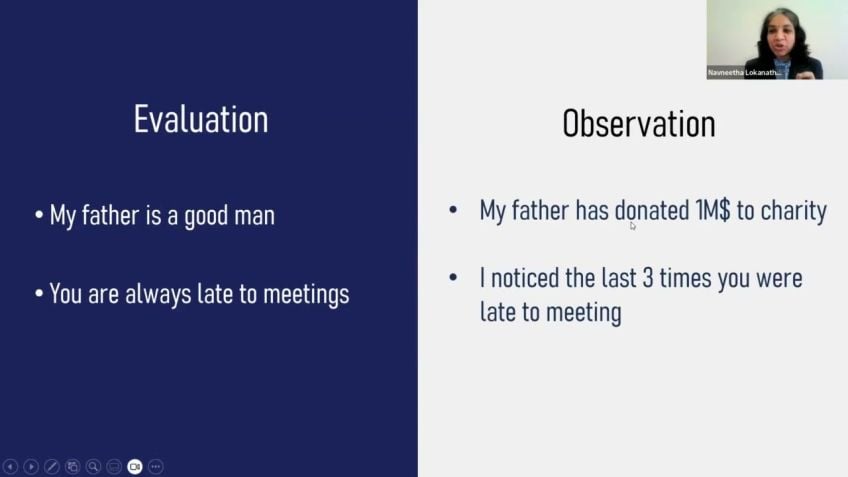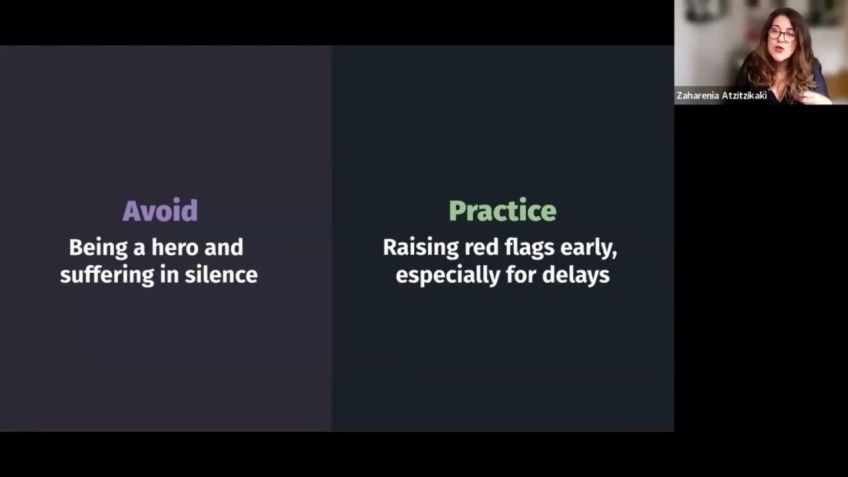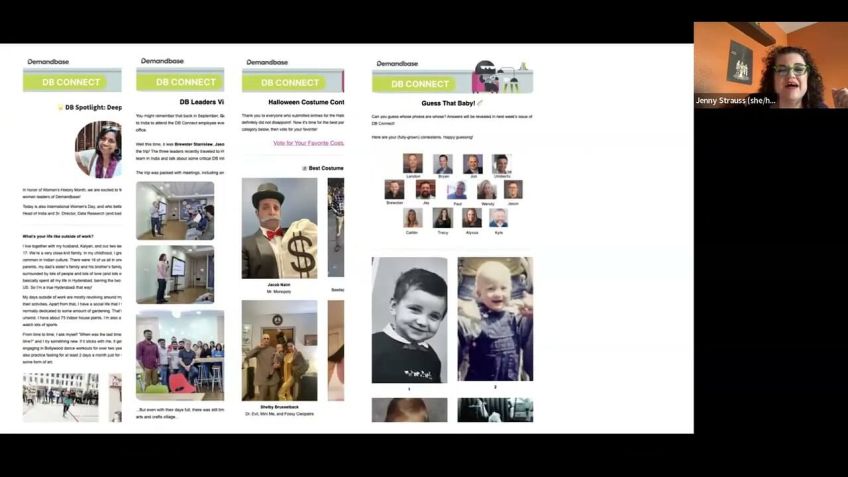(Not So) Hard Conversations: How To Give and Celebrate Actionable Feedback by Alexandria Butler
Unlocking the Art of Giving Receivable Feedback
Hello everyone, I am Lexie B! Today, we will delve into the art of giving receivable feedback. This skill is especially vital in the workplace, where feedback aimed at growth not only benefits the recipient but also contributes positively to the overall work environment.
Why is Receivable Feedback Important?
Feedback is often given but not received due to the method of presentation. This article aims to explore the science of giving receivable feedback, using my experiences and insights as a freedom fighter, founder of the online solidarity group Sister Circle, Black Women in Tech, and a chief of staff in the tech industry.
Understanding Feedback and Its Importance
Nikki Giovanni, renowned poet and activist, is known for a famous quote that summarizes the essence of this piece: "The unwillingness to try is worse than any failure." These words resonate with the concepts we will discuss, which also revolve around understanding oneself better and using one's skills to assist others.
The Metaphorical Approach to Feedback
Imagine getting served your favorite meal on a trash can lid. That brutal moment when what's good turns horrific is much like someone giving you feedback in a non-receivable way. This piece will provide tips on serving this "meal" or feedback in a manner that makes it receivable.
Mastering the Craft of Feedback
Understanding Self
Before exploring how to give feedback, it is essential to understand how you prefer to receive feedback. If it's hard for you to articulate the ways you like to receive feedback, this could be a good place to start rethinking and identifying specific conditions for your feedback suitability.
For instance, I like one-on-one feedback, preferably received within seven days. My appreciation of the feedback depends on the presenter's intentionality and whether they genuinely wish to see me grow. Identifying and communicating your preferred method of taking feedback helps foster a conducive feedback culture within the workplace.
Building Trusting Relationships
The next important step in giving feedback effectively is building relationships founded on trust, vulnerability, and respect. Leaders in particular, whether declared by title or influence, need to develop these relationships with their peers, direct reports, and management. Having a trusting relationship with colleagues makes the exchange of feedback smoother and more efficient.
Articulating Feedback Clearly
Articulating feedback involves determining why a particular action, behavior, or situation affected you negatively. Being able to explain why you felt a certain way from that act is key to delivering actionable and positive feedback.
Lexy B's 6-step framework for giving actionable feedback is as follows:
- Start by understanding how you like to receive feedback. Proceed to specify the behavior or situation you observed.
- Share your intention of giving feedback.
- Express gratitude to the person taking your feedback.
- Discuss the impact— how the behavior you observed affected you.
- Constructively workshop actions and solutions.
- Ask if the person wants your help. Remember that people don't have to take your feedback.
The goal here is to align the action, behavior or decision with its impact.
Conclusion
Proper, actionable feedback is a worthwhile gift in any professional or personal environment. Keep in mind that just like any gift, people are free to accept or reject it. It's also crucial to note that withholding feedback can be as harmful as giving non-receivable feedback.
I hope this thorough dissection and tips on giving feedback have been insightful. As we champion each other’s growth in our respective spaces, let's strive to give feedback in the most receivable way. Remember, everyone appreciates their favorite meal served on a beautiful plate. Let's practice handing criticism the same way.
Video Transcription
Started because we have so much content and we're just gonna do this. Hi, everyone. My name is Lexie B and I am so excited to be with you today and today we are really gonna talk about the art of giving receivable feedback.And I think we've all been there. We've been in situations particularly as women, even more particularly as a black woman where feedback is given and not received because the feedback and how I received it or I'm sorry, the how, how the feedback was presented to me was not the way in which I wanted to receive it.
So with that said, let's go ahead and get this thing going. So who am I? I am a freedom fighter, a self proclaimed freedom fighter. I am a person who strongly strongly believes that everyone has the ability and the responsibility to help other people in the workplace to be their best self. I am the founder of Sister Circle, Black women in tech, a 14,000 plus online community for black women in the tech space. It is a solidarity group that I created in 2017 to help black women navigate the tech industry. And to network and fellowship with each other. I'm also a storyteller. I love telling stories. I love having conversations, oral conversations, and oral storytelling to make sure people really understand where I'm coming from and not only as a storyteller and a professional speaker, I love to hear from other people as well.
And finally, my day job, I am a chief of staff. I do a lot of strategic operational work for a phenomenal leader in the tech industry. And in one of tech's most consumer based companies, I've been doing this for years and I always tell people if you are not a chief of staff, basically, if a program manager and a bodyguard and a strategic leader had a baby, that's my day job. You can find me on Twitter and Instagram at Lexy B speaks. You can find me on linkedin at Lexy B or you can find me on my website at www dot Lexy b.com. So let's get into this. The first thing that I want you to know in this whole conversation is a very famous quote by the poets and activists Nikki Giovanni who said the unwillingness to try is worse than any failure. And if there's anything you do in the next 17 minutes, I want you to try, I want you to try to understand yourself more than maybe you've ever been required to in a professional setting. And then I want you to try to see how you can use your superpowers and your skills to help someone else. And hopefully, maybe that trying will take itself not just from this conversation but to other conversations and places after we close.
So I want you to close your eyes and keep them closed. This is very important. And I want you to imagine that someone is about to make you your favorite meal. It's gonna be a phenomenal meal. I want you to think about your favorite meal. Ok. And you knew they were gonna make you this meal all week long. And so you're so excited about this meal. You get to their house. You can smell the flavors of the food outside before you walk in. You ring the doorbell and your heart starts pounding and pounding and louder and louder because you're so excited about this meal. They opened the door, they're wearing their best clothes. They're excited to have you come to their table to eat your favorite meal and guess what the meal smells like the way it's supposed to smell and you get to the table and they put the meal, not on a plate but on a trash can lid. Open your eyes and I wish I could see you, but I'm sure the ending of that story was horrific. Can you imagine someone making you your favorite meal and then serving it on a trash can lid? That is what it feels like. Smells like and tastes like when you decide to actively give someone feedback in a non receivable way. And that's why they get so upset even though they may not tell you that. So let's discuss how we can do that in a better way.
The first thing to understand about feedback is you have to understand who you are before you can give anyone feedback. It was Maya Angelou who wrote a quote that once said, forgive yourself for not knowing what you didn't know before you learned it. So this is what I want you to do. Have you ever sat and thought how you like to receive feedback in the workplace? And most people will say things like yes, Lexi of course, I have but no. Have you really, really thought about it? Do you enjoy feedback in a one on one setting? Do you want feedback in real time? Do you want feedback in front of people with a little bit of Sprinkle with a lot of Sprinkle? So we give you compliments and then we embed the feedback inside the cupcake of compliments. Do you want feedback that is solution oriented or feedback that says things like, hey, I'm gonna let you think about this and come up with a solution. Are you one of the people that say, give it to me straight? Don't sugar coat it, just give it to me straight or are you the person that says, please give me the feedback and then give me space to process and I'll come back to you. Are you the person that you would like an introduction to the feedback? You want someone to come to you and say, hey, I was wondering if we could have this conversation. Let me know when you're available. Are you the person who doesn't want feedback?
Those people exist and say, you know what you observe me for months and then tell me after you have a lot of statistical analysis and data of the thing that you think I did wrong. There are so many ways to give feedback and there's so many ways to receive feedback. But the question before you start giving feedback is, do you know how you like to receive feedback? I'm gonna give you one minute to think about that. Write it down, sit in your space. How do you like to receive feedback? What does that look like to you? And while you sit there also think about the many times in which you receive that feedback in a way that you did not like. And when you're done and if you feel comfortable, add the ways that you want to receive feedback in this chat and be very specific cause that's the key. It's not the what sometimes it's the how, what kind of conditions do you need in order to receive this feedback? And we're gonna see if we get these slides to work. Perfect. I love this. Let's continue. I hope you can see my slides. So I'm never gonna make you do something that I would never do with you. So here's who I am. I am a one on one feedback person. I am the kind of person that I need the feedback within seven days. You ask why? Seven days because I strongly believe that having a one on one with my manager every seven days is important.
So I always give my manager seven days to give me feedback. Also, the people that I work with that are not my manager because of the work that I do, I usually see everyone I work with within seven days. So that's usually my rule. Give it to me by the next time you see me, I'm candid, but I'm a few sprinkles because I strongly believe that your intentionality behind the feedback is more important than the feedback itself. And if we have a relationship where I can trust you and you can trust me, I know that you're giving me this because you wanna see me grow or because something that I did affected you in a way that you wanna make sure I know that again within seven days and canned it. That's my feedback. A little, I'm very, very big on that. So how do we do this? We have to build a relationship with our peers, with our direct reports and with our management on trust, vulnerability and respect. So folks in the room that are leaders and how I define leadership is not just the direct reports on your line on your organizational structure, how I define leadership is, you're the one that walks into the room and says I'm a leader, regardless of what my title is. You are the one that is leading with influence, leading with growth.
You are the one that we go to because you are the subject matter expert on this topic, we lean on you at work and fun fact, it is usually the women that we lean on at work, especially tech companies. And the issue with that leaning is that women are consistently underpaid Pearl Bear Bailey, who's a very, very, very famous entertainer that I highly recommend you. Google said your willingness to look at the io darkness and what was what empowers you to actually change? So let's look into that when you give feedback, feedback is not about the person that you're giving it to feedback is actually about you. And I always tell people when I'm giving these presentations that are usually multi hours long because I do feedback workshops is that I say before you give someone feedback, why do you think that behavior needed to be changed? Do you know how many times you receive feedback from someone and they actually cannot articulate to you? Why they didn't like it? Why they didn't like what she said, why they didn't like your tone? Why they didn't like that? Your thing was late, why they didn't like that? You may have called them out on accountability for a meeting, why they didn't like that. You were late. And so I want you to think about how you like to receive feedback in a perfect world.
And I want you to juxtapose that on a situation with someone who's trying to give you feedback. And imagine if someone has the audacity to come to you to give you feedback and they can't even say why they're upset. And you know what? It's funny because most people can't articulate why they're upset or why they're irritated or why they're anything on an emotional spectrum because we as humans, we do not do well with raising Children to become adults, to be able to communicate feelings. We tell kids all the time and even adults, interns, college kids business is not personal. There's no emotion in business even though feedback is a literal emotion. Because remember when you give feedback to someone, you're telling them your emotion, you're saying, hey, I did not like that you were late to my meeting, but we don't know why. Ok, great tardiness for the majority of the world, we say don't be tardy. But why are you specifically upset in this moment that I was late? So think about that as you give feedback before you ever give someone feedback, you need to be able to articulate why that why that situation, that behavior, that word that tone made you feel a negative way. Why do you think the behavior needs to be changed?
And I promise you, if you can do that, you will start giving feedback in a much more actionable and positive manner. So here's my spectrum and I know we only have a little bit more time. I always tell people when it comes to feedback. There's a few things, there's start 0.0 which is not on this slide, which is really understanding how you like to receive feedback. And the reason why that is the zero point is truly because if you can do the work to understand how you like to give feedback, then you can also require other people to do that work too. When you build relationships with them in the office, the first step of feedback is your observation. I need you to sit there and think what have I observed? And when you're talking to the person, you need to be very clear. I observed this feedback. I felt this way by this behavior. The second thing is intention. What is your intention about giving this feedback? Are you there to ask for help? Are you there to say, can we find a different way to do this? What is your intention around this feedback? The third step. And I would argue the most important step is gratitude after you say your observation.
And after you say your intention, you need to thank the person for sitting with you whenever I give feedback after I give my observation and my intention, I always say before we get into it, I wanna thank you. Thank you for having this conversation with me. Thank you for trusting me to have this conversation with you. And I'm so glad that we've built a relationship over time where you know that I am here to make you greater than you already are just like I would hope you'd want to do the same for me. Gratitude is very important. Impact many times people in the office and in our personal lives, hopefully, what they do is not the impact, right? It happens all the time. Even with Children on the playground, you hear it all the time with kids. Is that what they did was not the it was not what they wanted you to feel, right? So just because they didn't clean their room or they didn't do the dishes or they didn't listen to you does not mean that they don't respect you, right? So impact when you give the feedback, you need to use words like, hey, tell me about your intention in this moment. Thank you for that. This was the impact to me and or this was the impact to the person who told me about this. And then we go to the next step. Step five, I want to workshop with you right now or maybe at a different time that works for you. About actions, actionable ways solutions. So the next time your intention and your impact is aligned because that's all this is.
And the last step because you have to ask people, we are all adults and we all have agency and guess what? This is gonna sound quite harsh. People do not actually have to take your feedback, ask them if they actually want your help. You know, oftentimes in the world people just like to offer up help when we don't want it. And feedback is in that same category. So I want you to think about that as you start going to other people. And here's the quick recap in order to give actionable feedback, that is receivable to others, know who you are, know how you would like to receive feedback, know how you would like to accept feedback, build the right relationship with your peers and your direct reports from day one.
It's interesting that when you build trusting relationships where you're vulnerable with people, it is so much easier to give feedback when it is time. Do not wait to build a relationship with me. When you wanna tell me something, not positive. Do it from day one, treat me like a human from day one, use your actionable feedback steps that we talked about. Remember, feedback is a gift and just like any gift in the world, I do not have to accept it. And if I don't accept it, that does not mean that you did anything wrong. And also silence is violence. What we didn't have time to cover today is I also believe that the lack of giving feedback is very, very violent. And me personally, in my career, throughout my whole career, it wasn't the feedback that I did receive. It was the feedback that people did not give me so I could actually learn and grow that caused the most pain with that said, thank you so much for this simple recap about feedback. Have a wonderful day. Remember that whatever you do in your corporate or personal space, your job is to be a freedom fighter to help someone else.
And part of that freedom fighting layer is to really understand how to give feedback to each individual person, how to make their favorite food and put it on a beautiful plate. So they eat it, they comprehend it, they understand it and they ask for more. Have a great day. Bye.





